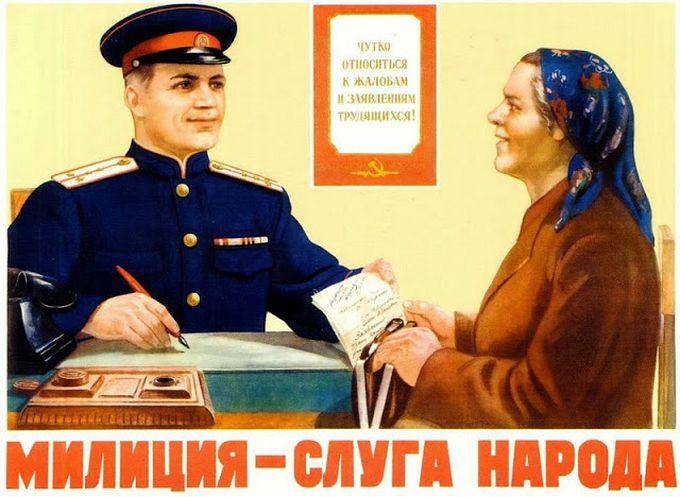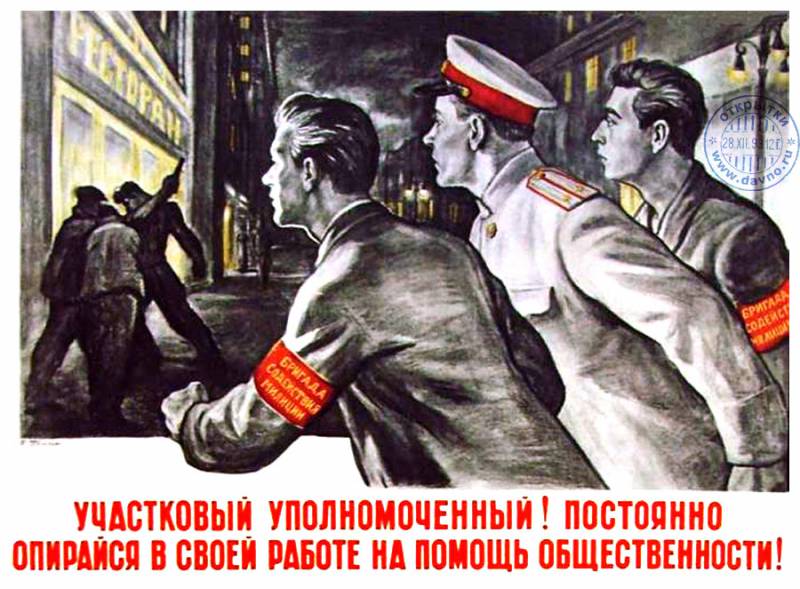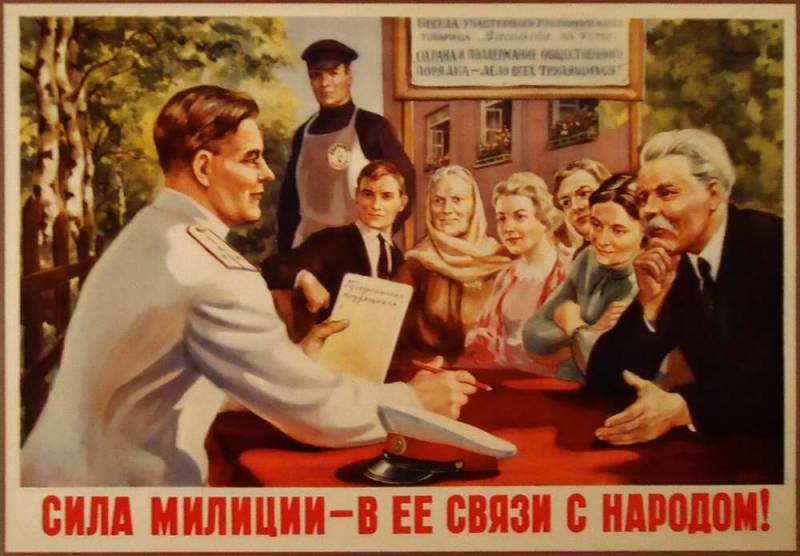Day district police authorized. The hard work of the most popular police
However, although the modern service of district police officers is rooted in the Soviet era, in fact story Russian precinct began much earlier. In 1782, the “Charter of Deanery or Police Officer” was approved, which regulated police service in the cities of the Russian Empire. In accordance with this charter, the territories of cities were divided into administrative and police units, each of which was responsible for 200-700 yards. The units included quarters responsible for 50-100 courtyards. The quarter overseer was in charge of maintaining order in the quarter. As a rule, the government of the deanery appointed a quarterly warden from the senior warrant lieutenants. From the quarterly warden expected exemplary behavior, friendly attitude towards people, disinterestedness and diligent administration of official duties. In addition, the quarterly warden was supposed to reside in the territory of the quarter for which he was responsible, or at least in the vicinity of this quarter. The duties of the quarterly overseer included supervision over the observance of laws by the residents of the quarter, recording and registering all residents of the quarter, monitoring the veneration of young elders, and the servants of the owners, resolving domestic quarrels and conflicts.
25 December 1862 was adopted new "Temporary rules on the police in cities and counties of the province", in accordance with which changes were made in the activities and structure of the police of the Russian Empire. Separate sections were created in large cities, subordinated to precinct police officers. Each section usually consisted of two or three okolotka. Each neighborhood covered 3-4 thousands of inhabitants. For the order in the territory of okolotkov okolotochnye guards were now responsible. The tasks of police guards included patrol service in the environs, fighting order and silence, preventing murders, robberies, thefts, robberies and other crimes, getting to know all residents of the neighborhood, their lifestyles and moods, registration control, delivery of agendas, participation in inventories of property and so on. In the subordination of the police guard were policemen who served in the territory of the neighborhood, and the janitors, who in the Russian Empire, as is known, were considered police assistants and performed some police functions.
The post of the guard of the guard corresponded to the lowest 14 class of the Table of Ranks. In fact, police guards occupied an intermediate position between lower police officers - city police officers and higher level police officers - bailiffs, etc. The police officers wore shoulder straps with a large longitudinal galloon — like army lieutenants and modern foremen in the army and police.

11 March 1917, after the February Revolution, the post of the guard in post-revolutionary Russia was eliminated. Revolutionary authorities generally wondered little about the fact that the police of the Russian Empire carried out the most important functions of any society for fighting crime and delinquency, protecting public order and the tranquility of citizens. The abolition of the old police force inevitably affected law and order and public security immediately after the February revolution. The militia of the Provisional Government recruited from students and yesterday's high school students was not a serious force capable of overcoming crime. The situation changed somewhat after the October Revolution, since the Bolsheviks sought to recruit police from the workers, among whom were still older people, stronger, many with experience in military service and war. In the Soviet police, the posts of senior police officers and volost police officers who were responsible for ensuring law and order in certain territories were introduced.
However, the streamlining of law enforcement activities in young Soviet Russia was complicated by the Civil War and the lack of financial and organizational resources to improve the activities of the Soviet police. However, by the beginning of the 1920's. Many steps have already been taken in the direction of increasing the effectiveness of police work. In 1922, the professional press raised the question of the need to return to the police a post similar to the pre-revolutionary near-warder overseer. In the end, the leadership of the People’s Commissariat of Internal Affairs of the RSFSR also agreed with the arguments of supporters of the introduction of this post. At this time, the NKVD of the RSFSR was led by Felix Edmundovich Dzerzhinsky, appointed to the post of people's commissioner 6 on July 1923.
November 17 The 1923 of the year was approved by the Instruction for the Local Superintendent. It defined the duties of the local warden and described this position. According to the Instruction, the local warden was responsible for the protection of public order and security and the supervision of citizens in a certain part of the city or urban-type settlement. Like the pre-revolutionary quarterly and police guards, the district guards of the NKVD of the RSFSR were supposed to reside in the territory of the settlements in their district and could not leave their district without the relevant permission of the district head. Three days later, an order was issued, in accordance with which the local warden received the right to control the service of the guard policemen at the station entrusted to him. Was fixed and the rate of service sites - 5000 people per site.
In 1930, the district overseers of the city militia and the rural police officers who worked at the polling stations were renamed the district police inspectors. This name was maintained until 1939, when local police inspectors were renamed precinct police officers. Only in 1970, the former name was returned - “local police inspector”. In 1974, the district police inspectors were subordinated to the prevention service and included in the criminal investigation department - as officers responsible for the prevention of criminal offenses. However, in 1986, the local police inspectors were again returned to the public order service. New changes in the organizational structure of the Ministry of Internal Affairs followed the collapse of the Soviet Union, during the formation of sovereign Russian statehood. Thus, in 1993, the Decree of the President of the Russian Federation “On the public security militia (local militia) in the Russian Federation” was adopted. In accordance with this decree, one local police inspector accounted for 3-3,5 thousands of people in the city or for one village or town council of people's deputies. In 2000, in accordance with the new decree, the post of district police inspector was renamed precinct police officer, and in 2011, after renaming the police police, it became precinct police officer.
Precinct police officers are part of departments (divisions, groups, departments) to ensure the activities of district police officers (OODUUP). The OODUUP structure includes the following positions: 1) Assistant District Police Officer, 2) District Police Officer, 3) Senior District Police Officer, 4) Deputy Chief of the Police Division for the District Police Officers, 5) Chief of the Police Division of the District Police Officers. However, depending on the local specifics, the list of posts in specific departments and divisions may vary, for example, there are not everywhere assistants of district police officers and deputy heads of OODUUP.
Today, the district police officer is one of the pillars of the Russian law enforcement system. Many precinct in 1990-x - 2000-x. took part in armed conflicts in the North Caucasus, protecting the public order to the best of their strength and capabilities. Some of them died in the line of duty, defending the constitutional order and ensuring the safety of citizens from criminals and terrorists.
At present, the main areas in which the district police officers carry out their activities are administrative practice, i.e. - drawing up protocols on administrative offenses; detection and disclosure of crimes of small and medium gravity; consideration of reports on crimes and appeals of citizens. In addition, district police officers are regularly involved in the service of ensuring public order in crowded places during public holidays. The district police officers document all the deaths of a person outside the hospital, in order to avoid concealing cases of violent death.
One of the most important tasks of district police officers today is the prevention of crimes and offenses in the areas entrusted to them. Good work of the district police officer inevitably affects the indicators - after all, if you really work with a problem contingent, observe the behavior of citizens recently released from places of detention, people with asocial behavior, alcohol and drug addiction, then many criminal acts can be prevented.
Unfortunately, the specifics of the work of modern district police officers is such that they are overloaded with “paper” activities to the detriment of actual practice of working with the public. Low wages and high demands entail the eternal problems of personnel shortages. It is difficult to demand effective work from the district commissioner if he is responsible not only for his area, but also for several other areas, since there are no district officers and no one can fill the vacant positions. A huge problem remains the constant “turnover” of personnel. Very young guys come to the posts of district police officers, who after working for a year or two, are transferred to other departments or are dismissed from the internal affairs agencies. Naturally, to become a real expert in your area, to gain fame and prestige among the population, especially from a specific contingent with whom the police have to work, is impossible in such a short time.
Very often precinct officers are forced to engage in not a romantic struggle with criminals, as shown in films about the police and the police, but as an absolutely routine activity related to responding to citizens' complaints, including those that are not under the jurisdiction of the police. Indeed, pensioners who are dissatisfied with the behavior or personalities of their neighbors, “Italian families”, in which quarrels and scandals have long become a peculiar way of life, often turn to the district police officer. All their complaints must be listened to, recorded and talked with people. On the other hand, the inevitability in the work of the district police officer is communication with the most deviant and asocial groups of the population. By virtue of his professional duties, a district policeman should contact alcoholics and drug addicts, prostitutes and moonshiners, homeless people and mentally ill people.
There is also an obvious problem with the motivation of employees - it is almost impossible to take a serious career as a district police officer unless you use this position as a springboard for transferring to another department. Who can become a district officer? Senior precinct? The head of the district division of the district? Therefore, young employees who are ambitious and career-oriented in the internal affairs bodies prefer, after having worked as a district officer, to transfer to other departments. The flip side of the coin is corrupt employees who, on the contrary, hold on to their place for years, if not decades, turning their activities into an illegal business and completely merging with shadow entrepreneurs, and even outright criminals. However, this is a problem not only of the precinct service, but also of other police units and the Russian law enforcement system as a whole.
Nevertheless, the profession of district police authorized today remains one of the most popular in the internal affairs bodies. Among the Russian precinct many honest and decent people, valiantly serving and performing all their duties. On the day of the professional holiday, it remains to wish the Russian precinct not only health, material well-being and the absence of combat losses, but also, no less important, respect from the population, so that the residents always value their precinct and take them into account.


Information